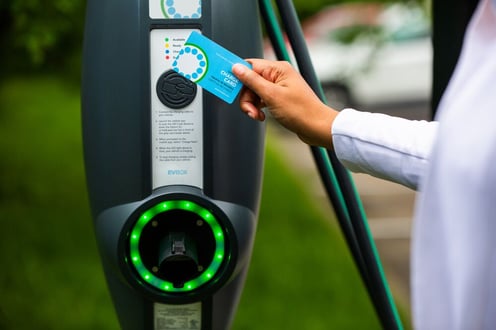
Why electric cars should be part of your sustainable business strategy [2023 update]
Last updated on 8th March, 2023
When drafting up your company’s new sustainability strategy, tackling transportation and commuting can have a huge impact.
Did you know that in the UK, driving an internal combustion vehicle (ICE) contributes to 91% of total transport emissions? Now add the fact that the majority of the global workforce commutes to work by car.
According to average driving behaviour and CO2 emissions of petrol and diesel vehicles per distance driven, we calculated that by electrifying your workplace fleet you could reduce up to about 10,000 kg of CO2 emissions per employee every year.
Sustainability is increasingly becoming the focus of many companies - as it should - and EVs are starting to play a more essential role in business strategies.
Of course, electric mobility is not a silver bullet for eliminating emissions, however, when implemented along with other actions, it can be a helpful tool in any company's sustainability toolkit. This article dives into the possibilities of reducing carbon emissions by adopting electric mobility and installing EV chargers at the workplace.
Electric mobility as a key solution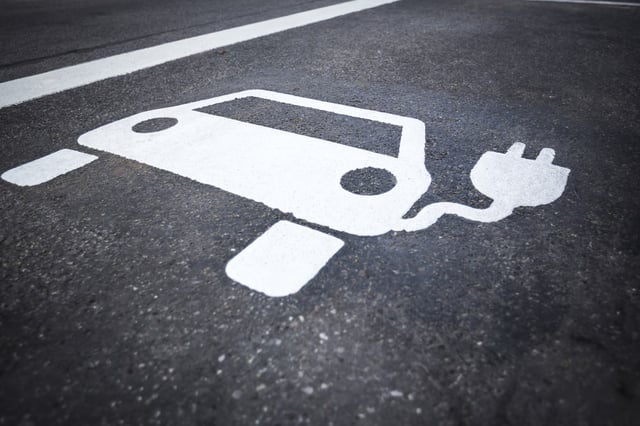
Transport is one of the main sources of emissions, both for individuals and businesses. Today, driving a combustion engine vehicle contributes 70 percent to emissions from transport. As such, one of the key solutions for addressing these emissions is electric mobility.
Today, the majority of the global workforce commutes to work by car. Even in environmentally-conscious countries like the Netherlands, more than 50 percent of the workforce drives to their workplaces. In fact, one-fifth of workers in Europe travel up to 18 miles a day and up to 19 miles a day in the UK, making them a significant source of greenhouse gas emissions and a problem your business can help solve by electrifying your fleet.
To put that into perspective, your average car in the EU emits around 116g of CO2 per kilometre, and in the UK it produces around 180g of CO2 every kilometre.
This means that if everyone were to switch to EVs, the EU would save around 807 kg of CO2 per vehicle per year. The numbers are even more impressive for the UK: each vehicle in the UK emits around 1,253 kg of carbon dioxide per year.
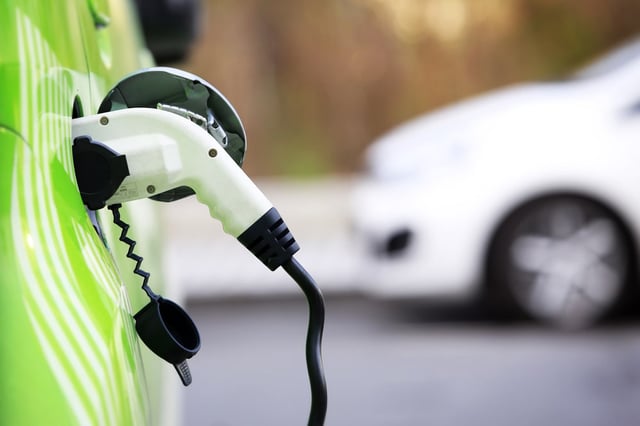
How electric mobility can help reduce the carbon footprint of your workplace
A carbon footprint is a commonly used tool to calculate the amount of greenhouse gasses generated by an activity. Calculating an organisation’s carbon footprint enables it to identify and quantify where its emissions are located, giving actionable insights for reducing them. Beyond social and ethical considerations, reducing emissions can generate direct economic benefits for businesses. For example, quantifying CO2 emissions can help identify and eliminate inefficient or wasteful processes, reducing energy bills.
There are three scopes that categorise the carbon emissions from a company. Scope 1 emissions are controlled directly by the organisation - such as the burning of fossil fuels by your business vehicles. Scope 2 emissions are those caused indirectly by the company. Scope 3 encapsulates the emissions down the supply and value chain.
Reduce CO2 emissions of employees
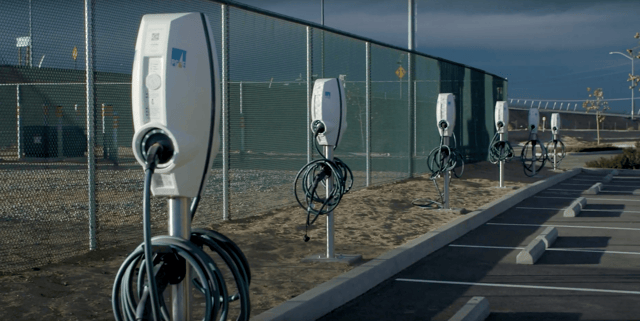
More and more workplaces are installing EV chargers at their facilities, not only to make their businesses greener but also to make their employees’ lives easier as the demand for charging locations rises.
Along with employee commute, many businesses own fleets of vehicles, ranging from cars for business travel to vans and trucks for distribution. The use of these vehicles by employees significantly adds to the organisation’s carbon footprint and can be a visible source of emissions that is easy to tie back to the company.
This is connected to scope 1 and 2 emissions that we mentioned previously - emissions directly controlled by the company and indirectly, respectively. Including EVs in your sustainable business plan will address those scope emissions and the concerns they raise, reducing your carbon footprint drastically.
Already, governments are targeting emissions from fleets. Since January in The Netherlands, for example, a new law has mandated companies with over 100 employees to report CO2 emissions from business travel. Companies that exceed a certain threshold must reduce their emissions within a four-year period—making decarbonisation an urgent focus. This, along with the electric switch we are seeing in so many countries, shows us that, indeed, the future is electric and that immediate action from businesses is needed.
Meanwhile in the UK there are less specific regulations in place for monitoring employee CO2 emissions. The 2006 Companies Act requires all companies quoted to report on their greenhouse emissions - not just for business travel. Other companies are not required to report their emissions but are encouraged to do so.
While other modes of transport can offer low-emission alternatives where road transport is necessary, EVs are the most efficient way of reducing carbon footprints. Indeed, most EVs have more than enough range for the daily commute and emit considerably fewer greenhouse gasses, or even none at all, depending on how the electricity was generated.
Escape the 'greenhushing'
While everyone was worried about greenwashing - companies making statements about being sustainable for marketing purposes but not actually making any efforts -, a new threat rose: greenhushing.
The new corporate sustainability trend was detected in a 2022 report by South Pole that stated that many companies are not publicising their environmental accomplishments. The reason behind it is still unclear, but it seems like many businesses are afraid that they don’t have what it takes to meet their sustainability goals, and, in fear of bad press, they would rather not make them public.
The incorporation of EVs and EV charging into your sustainable business plan is a relatively simple one that will help you not fall victim to greenhushing. For one, having EV charging stations at your business place is a walking advertisement of your sustainability efforts. Even if you choose not to publicise your goals and achievements to the public, anyone will be able to see them when they pass by, since they quite literally stand out in your parking lot.
Workplace EV charging and energy efficiency
Whether you generate your own electricity or rely on the power grid, installing EV chargers can be a catalyst for electric mobility, helping to reduce your carbon footprint. Today, most modern chargers are equipped with software enabling a number of smart features, ensuring charging can be as efficient as possible.
Addressing climate change is unquestionably one of the greatest challenges society has faced, and all businesses must do their part. The solution presented in this article for cutting emissions is the electrification of transport, which, when combined with EV chargers’ smart functionalities, can be a simple yet effective tool for moving towards a sustainable future that will benefit not only the environment but the business itself in the process.
Beyond meeting an increasingly urgent need for charging infrastructure that the boom in electric vehicle purchases created, boosting employee satisfaction, and being a potential revenue source, installing EV chargers is also an effective way to help reduce an organisation’s carbon footprint.
Read more about EV charging for workplaces
Offering EV charging at your workplace is not only a way to reduce your company’s environmental impact, but it could be an essential step to strengthen the relationship with your employees or customers. But understanding how EV charging can benefit your organisation can be challenging. Our complete beginners' guide aims to answer all questions you might have about the benefits of offering EV workplace charging.
Related articles

How to install EV chargers at the workplace?
Regardless of the type or model of charger you choose (or how much one costs), installing EV charging stations is...
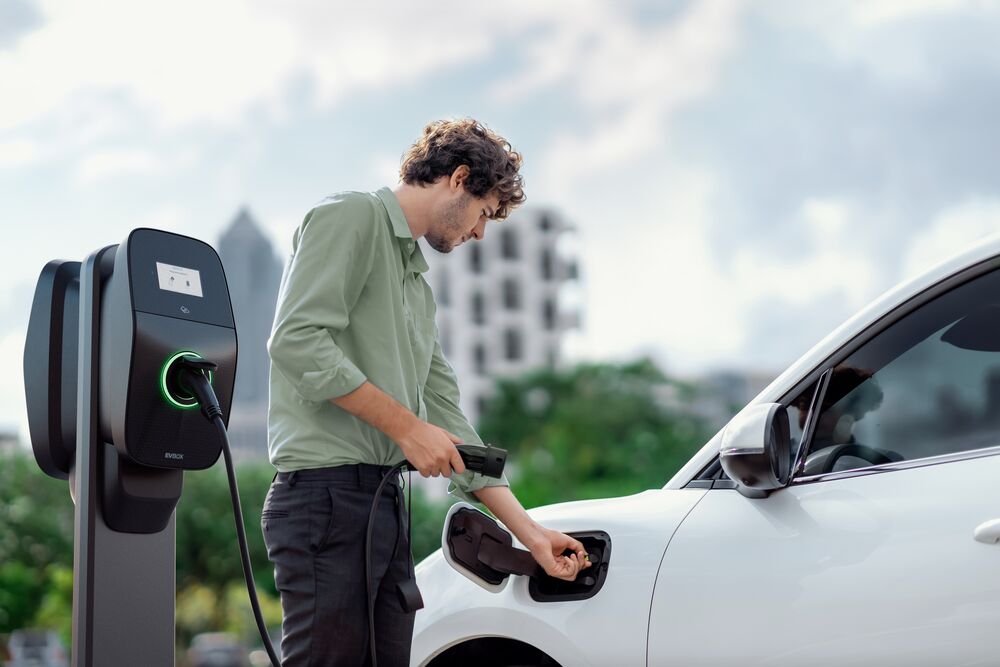
What do workplace EV chargers cost?
On average, AC workplace EV chargers tend to cost around £1,100 per charge port (excluding installation costs)....
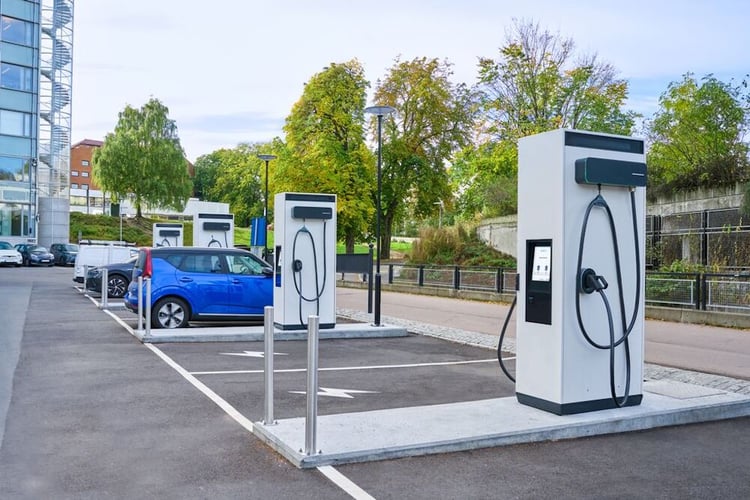
How to prepare your workplace for installing EV chargers
Installing EV charging stations at your workplace is a significant investment, so it’s important to consider the...
